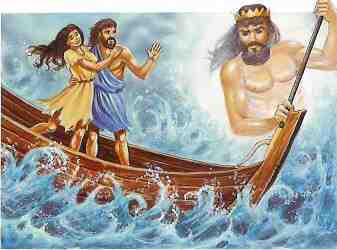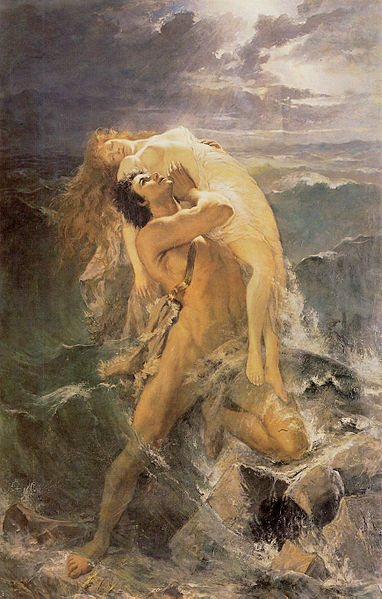DEUCALION often went to the Caucasus Mountains to comfort his suffering father. He could not break the chains that bound him, but while he was there, he could keep away the eagle that tortured Prometheus. Deucalion was a good son, and his father was thankful for his help.
Prometheus, who could look into the future, knew that Zeus was planning to flood the earth. He told his son to build an ark and board it with Pyrrha, his virtuous wife.
Deucalion did as his father told him. He built a sturdy ark, and when Zeus let loose all the winds and opened wide the floodgates of the sky, he went aboard with Pyrrha. For nine days and nine nights it rained until the whole earth was flooded. Nothing but the highest mountain peaks remained above water and all mortals were drowned. Only Deucalion and Pyrrha were saved; they floated in their ark over the deep, dark waters.
On the tenth day, the rain stopped, and slowly dry land began to appear. Deucalion and Pyrrha stepped out of the ark and walked about on the desolate earth. Lonesome and forlorn, they came to a temple, grown over with seaweed, and entered it. The sacred fire on the altar had gone out, but they lit it again with the embers they had kept glowing aboard the ark, and lifted up their hands in prayer to the gods to thank them for saving their lives. Zeus was touched by their piety and felt sorry for them because they were so lonesome. He spoke to them and said: "Pick up the bones of your mother and throw them over your shoulders."
Deucalion understood that Zeus did not mean their mortal mothers, but their Mother Earth. Rocks were her bones. He told Pyrrha to pick up a handful of stones and throw them over her shoulder while he did the same. Behind Deucalion, a score of men sprang up, and there, behind Pyrrha, a score of women. This new race of mortals was called Deucalion's race.
The Deucalion race, made from stone, was hardier than the one made from clay. The new mortals withstood better the stings of Pandora's miseries, which of course, had flown high and dry during the flood, and plague mankind to this very day.
The winds had carried on as they wished when Zeus flooded the earth. They were powerful fellows, and when they stormed together, they brought confusion and destruction, whirling dust and water all the way up to Olympus. Zeus decided that they needed a dependable guardian who would keep them locked up and let out only one at a time. He chose Aeolus, a grandson of Deucalion and Pyrrha, to be the keeper of the winds and sent him to live with them and guard them in a hollow cliff, far out at sea.
The winds hated to be confined. They stormed and howled around Aeolus, trying to force their way out of the cavern, but Aeolus was steady and strong and kept them in hand. When Poseidon or one of the other gods called for a wind, Aeolus pierced the wall of the cliff with his spear and let the wind out. Then he plugged up the hole and kept it closed until it was time for the wind to return.
When Boreas, the North Wind, was called for, he rushed out, icy and wild, tearing up trees and piling up waves in front of him. When Notus, the South Wind, was let out, he pressed himself groaning through the hole in the cliff. He was so heavy with moisture that water dripped from his tangled beard, and he spread a leaden fog over land and sea. Wanderers lost their paths and ships drifted helplessly about.
Zephyr, the West Wind, was gentler than his brothers. When he blew, he swept the sky clear of clouds and all nature smiled. Eurus, the East Wind, was the least important of the brothers. He wasn't called for often.
Prometheus, who could look into the future, knew that Zeus was planning to flood the earth. He told his son to build an ark and board it with Pyrrha, his virtuous wife.
Deucalion did as his father told him. He built a sturdy ark, and when Zeus let loose all the winds and opened wide the floodgates of the sky, he went aboard with Pyrrha. For nine days and nine nights it rained until the whole earth was flooded. Nothing but the highest mountain peaks remained above water and all mortals were drowned. Only Deucalion and Pyrrha were saved; they floated in their ark over the deep, dark waters.
On the tenth day, the rain stopped, and slowly dry land began to appear. Deucalion and Pyrrha stepped out of the ark and walked about on the desolate earth. Lonesome and forlorn, they came to a temple, grown over with seaweed, and entered it. The sacred fire on the altar had gone out, but they lit it again with the embers they had kept glowing aboard the ark, and lifted up their hands in prayer to the gods to thank them for saving their lives. Zeus was touched by their piety and felt sorry for them because they were so lonesome. He spoke to them and said: "Pick up the bones of your mother and throw them over your shoulders."
Deucalion understood that Zeus did not mean their mortal mothers, but their Mother Earth. Rocks were her bones. He told Pyrrha to pick up a handful of stones and throw them over her shoulder while he did the same. Behind Deucalion, a score of men sprang up, and there, behind Pyrrha, a score of women. This new race of mortals was called Deucalion's race.
The Deucalion race, made from stone, was hardier than the one made from clay. The new mortals withstood better the stings of Pandora's miseries, which of course, had flown high and dry during the flood, and plague mankind to this very day.
The winds had carried on as they wished when Zeus flooded the earth. They were powerful fellows, and when they stormed together, they brought confusion and destruction, whirling dust and water all the way up to Olympus. Zeus decided that they needed a dependable guardian who would keep them locked up and let out only one at a time. He chose Aeolus, a grandson of Deucalion and Pyrrha, to be the keeper of the winds and sent him to live with them and guard them in a hollow cliff, far out at sea.
The winds hated to be confined. They stormed and howled around Aeolus, trying to force their way out of the cavern, but Aeolus was steady and strong and kept them in hand. When Poseidon or one of the other gods called for a wind, Aeolus pierced the wall of the cliff with his spear and let the wind out. Then he plugged up the hole and kept it closed until it was time for the wind to return.
When Boreas, the North Wind, was called for, he rushed out, icy and wild, tearing up trees and piling up waves in front of him. When Notus, the South Wind, was let out, he pressed himself groaning through the hole in the cliff. He was so heavy with moisture that water dripped from his tangled beard, and he spread a leaden fog over land and sea. Wanderers lost their paths and ships drifted helplessly about.
Zephyr, the West Wind, was gentler than his brothers. When he blew, he swept the sky clear of clouds and all nature smiled. Eurus, the East Wind, was the least important of the brothers. He wasn't called for often.


Comments
Post a Comment